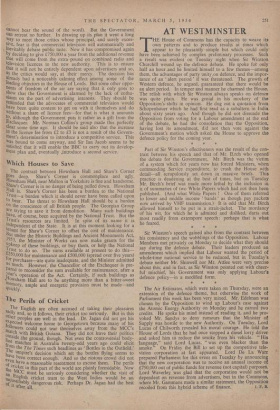The tired old controversy about commercial television being prodded into
life again now that the Government is on the point of publishing its Bill and making its intentions known in detail. There has rarely been an issue which gave rise to so many silly arguments, and no doubt they will all be trotted out again by those who support the BBC's monopoly (and yet cannot bear the sound of the word). But the Government can retreat no further. In drawing up its plan it went a long Way to meet those critics whose principal, and surely exces- sive, fear is that commercial television will automatically and inevitably debase public taste. Now it has compromised again by deciding to give £750,000 a year from the additional revenue that will come from the extra. pound on combined radio and television licences to the new authority. This is to ensure that it will not be entirely dependent upon advertisers and so, as the critics would say, at their mercy. The decision has already had a noticeably calming effect among some of the leading objectors in the House of Lords. But some other oppo- nents of freedom 'of the air are saying that it only goes to show that the Government is alarmed by the lack of enthu- siasm on the part of advertising interests. They should be reminded that the advocates of commercial television would have been quite content to get on with it themselves and do without a share of licence fees—for that is what it amounts to, although the Government puts it rather as a gift from the Exchequer. Mr. Norman Collins's group made this perfectly clear some time ago. It should be said also that the increase In the licence fee from £2 to £3 is not a result of the Govern- ment's determination to introduce a competitive service. This was bound to come anyway, and Sir Ian Jacob seems to be satisfied that it will enable the BBC to carry out its develop- ment plan and, eventually ,introduce a second service.



































 Previous page
Previous page